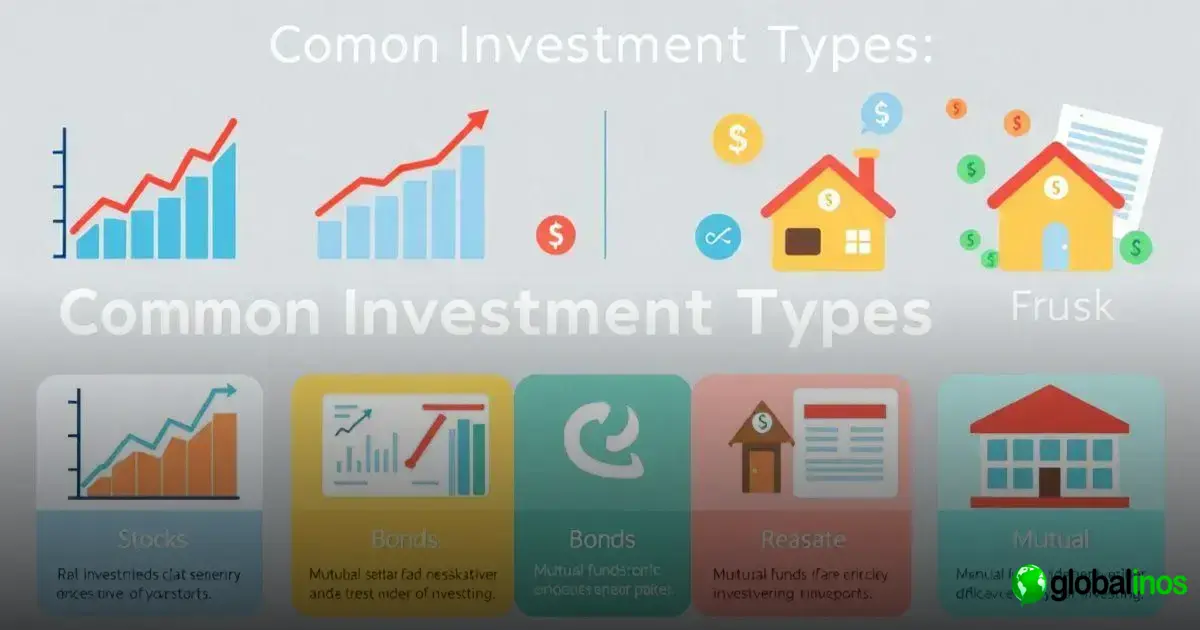Investing for beginners can seem daunting, but it opens the door to financial opportunities.
With the right knowledge and strategy, anyone can learn to navigate the investment landscape.
Understanding the basics of investing
Understanding the basics of investing is crucial for anyone looking to grow their wealth. At its core, investing means putting money into financial assets with the expectation of generating a return. There are several investment types to consider, including stocks, bonds, and mutual funds. Each type has its own characteristics and potential returns.
First, let’s discuss stocks. When you buy a stock, you own a small piece of a company. Stocks can be volatile, but they also have the potential for significant gains over time.
Next, we have bonds. Bonds are essentially loans that you provide to companies or governments. They tend to be less risky than stocks but usually offer lower returns.
Lastly, mutual funds allow you to pool money with other investors to buy a diversified portfolio of stocks and bonds. This diversification helps manage risk.
By grasping these fundamental concepts, you’ll be better equipped to make informed decisions as you begin your investing journey.
Common investment types explained

When investing, it’s essential to understand the common investment types available. Each type offers unique benefits and potential risks. Let’s explore them:
1. Stocks: Buying stocks means purchasing shares in a company. This can lead to high returns, but stocks can also be volatile. It’s important to research and choose companies wisely.
2. Bonds: Bonds are loans to companies or governments. They usually offer lower returns than stocks but come with less risk.
3. Mutual Funds: These are collections of stocks and bonds managed by professionals. They allow for diversification, which can reduce risk.
4. Exchange-Traded Funds (ETFs): Similar to mutual funds, ETFs have a variety of assets but trade like stocks on exchanges.
5. Real Estate: Investing in property can yield income through rent and appreciate over time. However, it requires more capital and management skills.
By knowing these common investment types, beginners can make more informed choices as they start their investing journey.
How to start investing with little money
Starting to invest with little money is entirely possible and can be a smart way to build wealth over time. Here are some strategies you can use to begin your investment journey, even on a budget.
- Open a Savings Account: Before investing, establish an emergency fund in a savings account. This will help you avoid selling investments in a hurry if you face unexpected expenses.
- Use Investment Apps: Many apps allow you to start investing for beginners with just a few dollars. These platforms often have no minimum balance requirements and offer easy access to stock markets.
- Start with Fractional Shares: Instead of buying whole shares of expensive stocks, consider investing in fractional shares. This means you can purchase a portion of a share, making it easier to diversify your investments.
- Take Advantage of Employer-Sponsored Plans: If your employer offers a retirement plan, such as a 401(k), consider contributing, especially if they match contributions. This is essentially free money that helps grow your investment.
- Consider Index Funds: Investing in index funds can be an excellent option for beginners. They are usually low-cost and provide exposure to a broad range of stocks, helping to spread out risk.
With these strategies, anyone can start investing, regardless of how much money they have. The key is to begin now and stay consistent with your contributions.
Mistakes to avoid as a new investor

As a new investor, avoiding common mistakes can make a big difference in your financial journey. Here are some critical mistakes to avoid:
1. Not Doing Research: One of the biggest errors new investors make is not researching before investing. Always learn about the company or fund you are considering. Understanding its history, management, and market conditions can save you from losses.
2. Emotional Investing: Making decisions based on emotions can lead to poor choices. Fear and greed can cause people to buy high and sell low. Stick to your investment strategy and avoid reacting to market fluctuations.
3. Timing the Market: Many believe they can predict market movements, but this is often unsuccessful. Instead of trying to time the market, focus on a long-term strategy for growth.
4. Ignoring Fees: Every investment platform has fees that can eat into your profits. Make sure to understand the fees associated with your investments and choose low-cost options if possible.
5. Having No Plan: Investing without a clear plan is like sailing without a map. Set clear goals, whether for retirement, buying a home, or other purposes, and choose investments that align with those goals.
Resources for learning more about investing
Learning more about investing is essential for anyone who wants to grow their wealth. Here are some resources to help you gain knowledge and confidence in your investment journey.
1. Books: Many great investing books can provide valuable insights. Titles like ‘The Intelligent Investor’ by Benjamin Graham and ‘A Random Walk Down Wall Street’ by Burton G. Malkiel offer timeless advice.
2. Online Courses: Websites like Coursera, Udemy, and Khan Academy offer courses on investing that can help you understand the basics and advanced concepts. These courses often allow you to learn at your own pace.
3. Financial News Websites: Sites like CNBC or Bloomberg provide up-to-date information on market trends, stock prices, and investment news. Keeping up with the news can help you make informed decisions.
4. Podcasts: Listening to investment podcasts can be a fun way to learn while on the go. Shows like ‘Invest Like the Best’ and ‘The Motley Fool Investing Podcast’ share strategies and insights from experienced investors.
5. Investment Forums: Online forums such as Reddit’s r/investing or Bogleheads can provide community support and peer advice. Engaging with others can help clarify your questions and boost your confidence.
Using these resources, you can continue to enhance your investing knowledge and make better decisions along your financial journey.
The key to successful investing: Informed and patient choices
Investing can be a valuable way to build wealth, especially for beginners. By understanding the basics, exploring common investment types, starting with small amounts, learning from mistakes, and utilizing various resources, individuals can navigate the world of investing for beginners confidently.
As you embark on your investing journey, remember to stay informed, remain patient, and continuously educate yourself. Investing is not just about making money; it’s about making smart choices that align with your financial goals and dreams.





